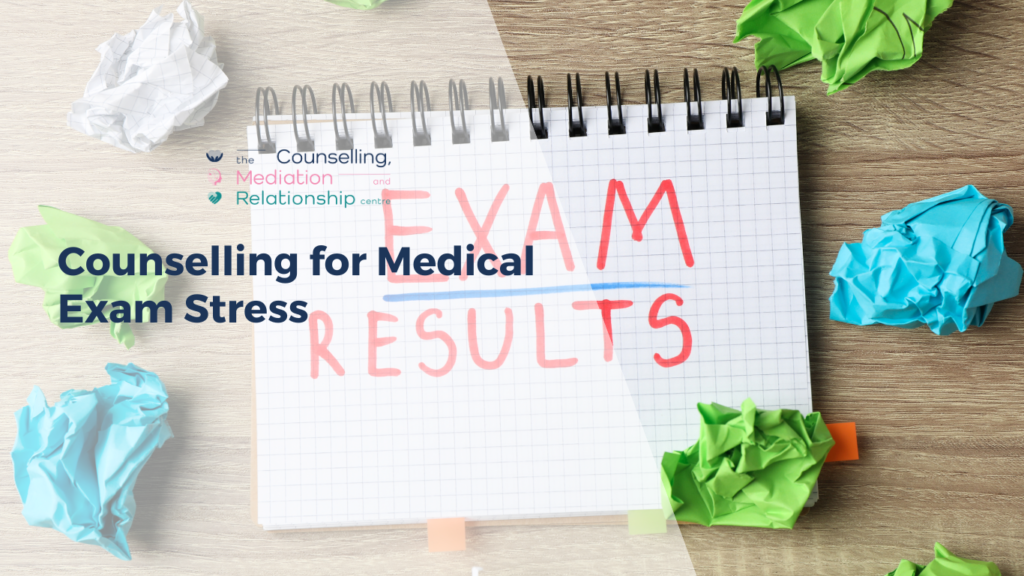Counselling for Medical Exam Stress

Counselling for Medical Exam Stress
Studying medicine or veterinary science is one of the most demanding paths you can choose. The workload is relentless. The placements are challenging. The exams are make-or-break moments that decide your progress. For many, the stress of these exams can feel impossible to manage.
Why Exam Stress Feels Overwhelming
Medical and veterinary exams are unlike most assessments. They test not only your knowledge but also your emotional endurance. UK medical students face the Medical Licensing Assessment (MLA), which includes written and clinical exams. International medical graduates must pass the PLAB exams to register with the General Medical Council (GMC). Veterinary students face equally strict assessments set by the Royal College of Veterinary Surgeons (RCVS).
Failure can delay or block your career progression. That reality creates heavy emotional pressure. It makes exam stress feel intense, constant, and sometimes unbearable.
Why High-Achieving Students Struggle More
High-achievers often hold themselves to impossible standards. Many medical and veterinary students describe a strong fear of failure, perfectionism, or imposter syndrome. They feel pressure to perform flawlessly. Some believe that struggling with stress means weakness.
In truth, the opposite is correct. High-achieving individuals are more likely to experience stress because they care deeply about their performance. Counselling helps identify these unhelpful beliefs and replace them with more realistic and compassionate thinking.
Through counselling, students learn that their worth is not tied to grades. They learn how to manage performance anxiety and self-criticism effectively.
Common Signs of Exam Stress
Research shows that around one in five medical students experience high or severe test anxiety. The signs often appear gradually. Recognising them early is key to managing them.
Common symptoms include:
• Difficulty sleeping or waking up exhausted
• Rapid heartbeat or shortness of breath before exams
• Forgetting material despite thorough preparation
• Loss of appetite or digestive problems
• Harsh self-talk and constant self-doubt
Many students assume others are coping better. In most cases, others are facing the same hidden struggle.
How Counselling Helps Manage Exam Stress
Counselling provides a safe space to unpack anxiety and understand how it affects your performance. It offers practical tools that help you manage pressure and maintain focus.
Counselling support often covers:
• Stress regulation through mindfulness and relaxation techniques
• Time management and realistic planning
• Cognitive restructuring to reduce negative thinking
• Self-compassion and positive internal dialogue
• Restoring lifestyle balance through better sleep, nutrition, and exercise
Working with a counsellor helps students stay calm, focused, and emotionally stable during preparation and on exam day.
Simple Tools to Use Before and During Exams
While counselling provides long-term strategies, small actions can also help reduce immediate stress.
On exam day, try these techniques:
• Grounding exercise – Notice five things you see, four you touch, three you hear, two you smell, and one you taste.
• Controlled breathing – Inhale for four seconds, hold for four, exhale for four.
• Positive statements – Replace “I will fail” with “I have prepared and I can do this.”
• Movement – Stretch or roll your shoulders during breaks to reset focus.
• If you blank out – Pause, breathe, and return later with a calmer mind.
These simple steps help your brain switch from panic to problem-solving.
Long-Term Benefits of Counselling
Exam stress is only one part of a medical career. Doctors and veterinarians face ongoing assessments, continued learning, and professional evaluation throughout their working lives. Managing stress early creates emotional resilience that lasts beyond university.
Counselling also reduces feelings of shame or isolation. Many students believe anxiety makes them weak. Counselling helps them realise that stress is a normal response to high expectations. Talking about it allows healing to begin.
When students learn how to manage anxiety effectively, they perform closer to their true potential. They think clearly, focus better, and show the skills they have worked hard to develop.
Frequently Asked Questions
- How does counselling help medical and veterinary students facing exam stress?
Counselling helps students identify the root causes of their anxiety and teaches evidence-based strategies for managing stress. It focuses on thought patterns, coping techniques, and practical planning. Students learn how to perform under pressure without losing confidence or balance. - When should I consider counselling for exam stress?
If you feel constant anxiety, struggle to focus, or experience physical symptoms like loss of sleep or appetite, it may be time to seek counselling. Early support prevents stress from becoming overwhelming and improves both mental health and academic performance. - What type of counselling works best for exam-related anxiety?
Cognitive Behavioural Therapy (CBT) is commonly used for exam stress. It helps identify negative thoughts and replace them with realistic and helpful ones. Some students benefit from mindfulness-based counselling or solution-focused therapy, depending on their needs. - Can counselling improve exam performance?
Yes. When stress is managed effectively, students concentrate better, retain information, and make fewer mistakes under pressure. Counselling helps students reach the performance level they are truly capable of. - How long before exams should I start counselling?
Starting early provides the most benefit. Many students find that four to six sessions help them manage anxiety before exam season. Others continue through their studies to maintain consistent support. - Is counselling confidential?
Yes. All counselling sessions are private. Nothing you share is disclosed without your consent. This allows you to speak freely and work through your concerns safely.
Final Thoughts
Exam stress is common among medical and veterinary students, but it does not need to define your experience. Counselling provides a structured way to manage pressure, build confidence, and protect your wellbeing throughout your studies and beyond.
If you are struggling with exam-related anxiety, reaching out for counselling is a step toward strength, not weakness. Support is available. You deserve to feel calm, capable, and confident when you step into the exam room.
Book an Appointment
📍 Visit us at: Shop 2/44 Ulong St, Griffith NSW 2680
📧 Email: donna@griffithcounselling.com
Take the first step toward caring for your well-being today. Reach out to schedule an appointment and begin your journey to a more balanced, fulfilling life.

 Previous Post
Previous Post Next Post
Next Post